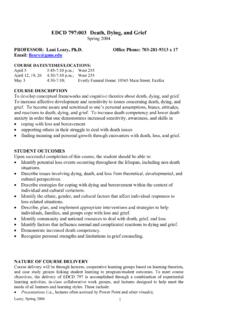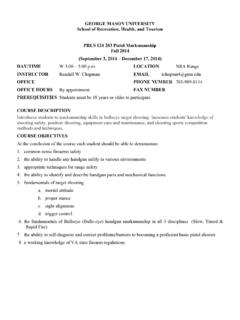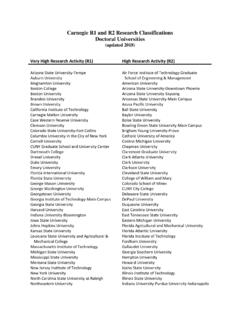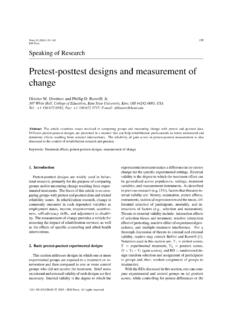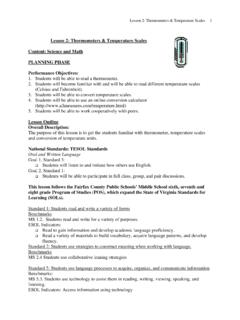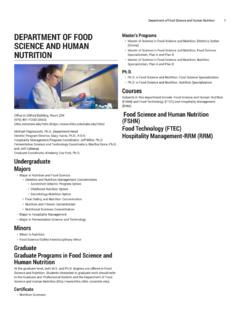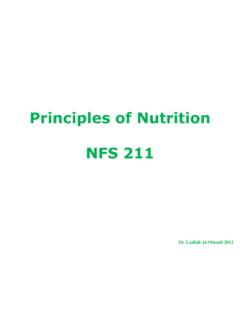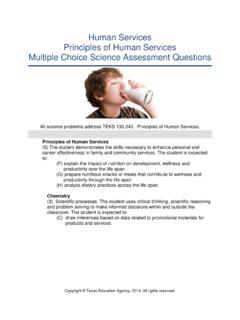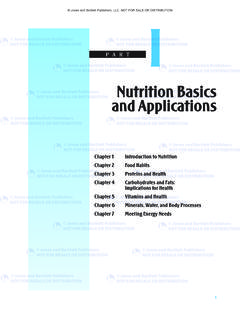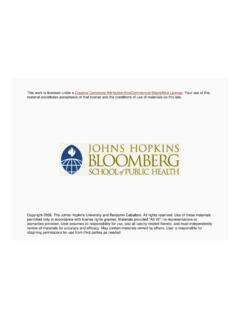Transcription of GEORGE MASON UNIVERSITY KINE 320 DL 1 Principles of …
1 GEORGE MASON UNIVERSITY School of Recreation, Health, and Tourism Division of Health and human Performance KINE 320 DL 1 Principles of human nutrition (3) Fall 2015 DAY/TIME: Online LOCATION: Online PROFESSOR: Robyn L. James, MS, ACSM CEP EMAIL ADDRESS: OFFICE HOURS: By appointment only PREREQUISITES/COREQUISITES None CATALOG COURSE DESCRIPTION (KINE 320) Assesses dietary habits and patterns in relation to nutrient requirements across the age spectrum and for a variety of populations. Emphasizes weight control, diet in relation to physical activity, and current nutritional controversies. COURSE OBJECTIVES (KINE 320) At the completion of this course, students will be able to: 1. Differentiate the roles of carbohydrates, protein, fats, vitamins, and minerals in one s diet across the lifespan.
2 2. Describe the digestive process as it relates to the utilization of nutrients for energy production and metabolism. 3. Explain the various methods utilized to measure body composition. 4. Explain the importance of nutrition as it relates to exercise and physical activity for a healthy lifestyle. 5. Evaluate a variety of diets reported in the popular literature. 6. Plan a nutrition program for both weight loss and weight gain for clients. COURSE OVERVIEW The course focuses on the basic Principles of nutrition and its application in practice and overall health. It will be module based learning to elicit thought provoking discussion to help emphasize key concepts. Current topics and issues will be presented and discussed throughout the course to help students translate theory into practice. 1 The first part of the course will focus on the components of a nutritious diet, nutrition standards, macronutrients and micronutrients.
3 The second part of the course will delve further into nutrition and its relationship to health, disease, fitness, ergogenic aids, obesity, and nutrition through the lifespan. REQUIRED READING Sizer,R.,&Whitney,E.(2013). NutritionConceptsandControversies,13 ,CA:Cengage Learning ACCREDITATION STANDARDS This course meets the Commission on Accreditation of Allied Health Education Programs (CAAHEP) requirements and covers the following American College of Sports Medicine s Knowledge Skills Abilities (KSA's): KSA Description Lecture, Lab, or both GENERAL POPULATION/CORE: nutrition AND WEIGHT MANAGEMENT Knowledge of the role of carbohydrates, fats, and proteins as fuels for aerobic and anaerobic metabolism. Lecture Knowledge of the following terms: obesity, overweight, percent fat, BMI, lean body mass, anorexia nervosa, bulimia, metabolic syndrome and body fat distribution.
4 Lecture Knowledge of the difference between fat soluble and water soluble vitamins. Lecture Knowledge of the USDA Food Pyramid and Dietary Guidelines for Americans. Lecture Knowledge of the importance of calcium and iron in women's health. Lecture Knowledge of the number of kilocalories in one gram of carbohydrate, fat, protein, and alcohol. Lecture Knowledge of the number of kilocalories equivalent to losing 1 pound of body fat and the ability to prescribe appropriate amount of exercise to achieve weight loss goals. Lecture Knowledge of the guidelines for caloric intake for an individual desiring to lose or gain weight. Lecture DELIVERY METHOD 2 ThiscoursewillbedeliveredonlineusinganAs ynchronousformatviatheBlackboardlearning management system(LMS) emailname(everythingbefore ) starting August 31, 2015.
5 TECHNICAL REQUIREMENTS To participate in this course, students will need the following resources: High speedInternetaccesswithastandardup to datebrowser,eitherInternetExplorerorMozi lla Firefox Opera and Safari are not compatible with Blackboard. ConsistentandreliableaccesstotheirGMUema ilandBlackboardaccounts,asthesearetheoff icial methods of communication for this course. Studentsmaybeaskedtocreateloginsandpassw ordsonsupplementalwebsitesand/ortodownlo ad trialsoftwaretotheircomputer,tablet,orsm artphoneaspartofthecourserequirements. IMPORTANT:Whenyoucreateaprofileforthisor othercourse relatedwebsites,pleaseusea generaluserIDandpasswordthatisnotveryper sonal,asyoumaybeaskedtosharethiswiththe instructor and/or group members.
6 IfyouarehavingtroubleloggingintoBlackboa rd,contactITUat703 993 8870or forassistancewithinBlackboard,contactthe CollaborativeLearningHubat 703 993 3141 or BlackboardonDemand ForStudents: tutorialsonhowtousemanyofBlackboard sfeatures,includingpostingtoadiscussionb oard, posting an assignment, and checking your grades. Classannouncementsandreminderswillbemade throughtheBlackboard Announcements function. aware of the information communicated through these venues. COURSE EXPECTATIONS Participation: You are expected to actively participate in class discussions, and fulfill all assignments. Excessive non participation will be handled individually. Course Week: Because asynchronous courses do not have a fixed meeting day, our week will start on Monday at noon, and finish on the following Monday at noon.
7 All assignments must be completed within the weekly period. Late work will not be accepted. 3 Log inFrequency: StudentsmustactivelycheckthecourseBlackb oardsiteandtheirGMUemail for communications from the instructor at a minimum of 3 times per week . Participation:Studentsareexpectedtoactiv elyengageinallcourseactivitiesthroughout the semester,whichmayincludeviewingofallcour sematerials,completingcourseactivitiesan d assignments, and participating in course discussions and group interactions. TechnicalCompetence:Studentsareexpectedt odemonstratecompetenceintheuseofallcours e components of the course. TechnicalIssues:Studentsshouldexpectthat theycouldexperiencesometechnicaldifficul tiesat somepointinthesemesterandshould,therefor e, be accepted based on individual technical issues.
8 Workload: Expecttologintothiscourse atleast3timesaweektoreadannouncements,pa rticipate inthediscussions, ,thiscourseis notself specificdeadlinesand duedateslistedinthe CourseSchedule sectionofthissyllabustowhich sresponsibilitytokeeptrackoftheweeklycou rse schedule of topics, readings, activities and assignments due. Advising:Ifyouwouldliketoscheduleaone on onemeetingtodiscusscourserequirements, contentorothercourse relatedissues,andyouareunabletocometothe Masoncampus,wecan on onesessionandincludeyourpreferred meeting method and suggested dates/times. Netiquette:Ourgoalistobe collaborative , readyourresponsescarefullybefore you post them. Be positive in your approach to others and diplomatic with your words.
9 E mail Correspondence: Only messages that originate from a GEORGE MASON UNIVERSITY address will be accepted. Please address the subject line for all email pertaining to this course as KINE 320 DL1: Last Name purpose of email . Emails will be answered within a 24 hour time period , most often, between the hours of 8pm 10pm. Please be mindful of the time at which your email is sent in respect to assignment deadlines as messages sent after 10pm may not be addressed until the following evening. Professionalism: Kinesiologystudentsareexpectedtobehavein aprofessionalmanner. Dependinguponthesettingprofessionalismma yappeardifferent,buttypicallyconsistsof professionalism generally comprises the following components: 4 Attendance unexpectedlymissaclassduetosomethingouto fyourcontrol,contacttheinstructor within24hourstonotifythemwhathappenedand toseeifthereisanythingyouneedto do to make up your absence.
10 Communication Whencommunicatingwiththeinstructorandcla ssmates,either face to faceorviatheassignedGeorgeMasonUniversit yemailaddress,students shouldaddresstheotherpersonappropriately ,useappropriatelanguageandmaintaina pleasant demeanor. Participation have an interest in the subject matter. Responsibility/Accountability Professionalstakeresponsibilityfortheira ctionsand assignmentsontime,submittingworkthatisof appropriatequality,honoring commitments and owning up to mistakes. Honesty/Integrity Studentsareexpectedtobehonestwiththeinst ructor,classmates in an ethical manner. Self Improvement/Self awareness One should be aware of their strengths/weaknesses and constantly seek to improve. Professionals regularly seek out opportunities to increase their knowledge and improve their current skill set.


